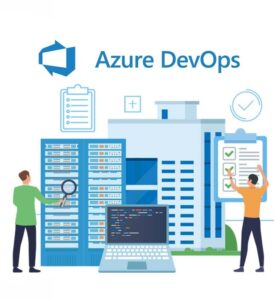Azure DevOps
Empowering Careers with Educate U: Advanced Azure DevOps for Seamless Development and Deployment
In an era where agility, collaboration, and continuous delivery are paramount to success in software development, mastering the tools and practices that streamline the development lifecycle is essential. Welcome to Educate U’s comprehensive Azure DevOps training program, where we empower individuals with the knowledge and skills needed to excel in the fast-paced world of DevOps.

Introduction to Azure DevOps
In this foundational chapter, participants will gain an understanding of the core concepts of DevOps and how Azure DevOps facilitates collaboration, automation, and continuous delivery. We’ll explore the key components of Azure DevOps, including Azure Repos, Pipelines, Boards, Artifacts, and Test Plans, and discuss how they integrate to support the end-to-end software development process.
Setting Up Your Development Environment
Getting started with Azure DevOps requires setting up the right environment and configurations. In this chapter, participants will learn how to create and configure projects, repositories, and pipelines in Azure DevOps. We’ll cover best practices for organizing code, defining branching strategies, and configuring build and release pipelines to automate the deployment process.
Building and Testing Applications
With the groundwork laid, it’s time to dive into the nuts and bolts of building and testing applications using Azure DevOps. Participants will explore techniques for defining build configurations, running automated tests, and ensuring code quality and reliability. We’ll also cover advanced topics such as integration with third-party tools and services to enhance the testing process.
Implementing Continuous Integration and Continuous Deployment (CI/CD)
Continuous Integration and Continuous Deployment (CI/CD) are at the heart of DevOps practices, enabling teams to deliver software changes rapidly and reliably. In this chapter, participants will learn how to set up CI/CD pipelines in Azure DevOps, automate the build and release process, and implement strategies for monitoring and managing deployments.
Collaboration and Agile Planning
Effective collaboration and agile planning are essential for successful software development projects. In this chapter, participants will explore Azure Boards, which provide tools for agile project management, including backlogs, sprints, boards, and dashboards. We’ll discuss how to plan, track, and prioritize work items, enabling teams to stay aligned and deliver value consistently.
Monitoring and Feedback
Monitoring and gathering feedback are crucial aspects of the DevOps lifecycle, enabling teams to identify issues quickly and iterate on improvements. In this chapter, participants will learn how to leverage Azure Monitor and Application Insights to gain insights into application performance, usage, and health. We’ll also discuss strategies for collecting and acting on user feedback to drive continuous improvement.
Security and Compliance
Security and compliance are paramount concerns in today’s software development landscape. In this chapter, participants will explore best practices for implementing security measures and ensuring compliance with regulatory requirements in Azure DevOps. We’ll cover topics such as access control, encryption, vulnerability scanning, and compliance reporting.
Advanced Topics and Integration
To round out their Azure DevOps proficiency, participants will delve into advanced topics and integration scenarios. We’ll explore topics such as infrastructure as code (IaC), containerization, microservices architecture, and integration with other Azure services and third-party tools. Participants will gain insights into how Azure DevOps fits into broader DevOps and cloud-native development strategies.

Ready to Dive into Practical Azure DevOps Training?
Enroll now in our Practical Training Program and take the first step towards mastering AWS with confidence.
